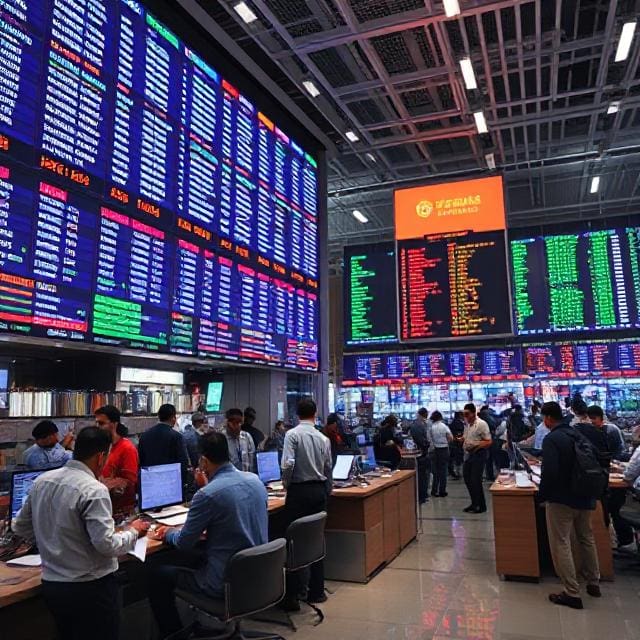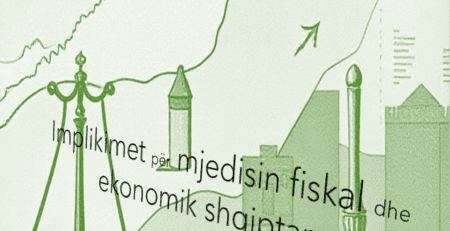Why does Albania remain outside the stock market?
In a context where the Albanian economy has demonstrated steady growth and several leading companies have achieved significant financial turnover—often surpassing the average capacity of comparable markets in the region, the absence of a developed stock market continues to be a major obstacle to further economic advancement.
At first glance, the country seems to have what it needs: capital, thriving businesses, and a stable financial sector.
Yet behind this surface, Albania still lacks a fundamental mechanism to mobilize domestic capital and enable citizens to participate in economic growth through equity investments.
At its core, this absence is not the result of economic weakness but of a deep divide between the “real economy” and the financial system. The real economy generates substantial profits and circulation, while the formal financial sector fails to channel this potential into sustainable investment forms.
This disconnect stems from a complex combination of factors: widespread informality, lack of transparency, weak regulatory institutions, and a business culture that views the sharing of ownership as a risk rather than an opportunity.
An economy that grows without a capital market
If judged solely by macroeconomic indicators, Albania should already have had an active stock market for years.
According to the World Bank (2024), GDP per capita has surpassed the 10,000 USD threshold for the first time, with a real growth rate of 3.9%, while the 2025 forecast remains at 3.4%.
The IMF ranks Albania among the most stable-growing economies in Southeastern Europe, with a sustainable fiscal outlook and rising foreign direct investments.
On a microeconomic level, Albanian companies are consolidating rapidly.
In 2024, according to Monitor Magazine, the 200 largest companies in the country generated over 9 billion euros in total turnover, while around 40 of them achieved more than 50 million euros annually.
Under normal circumstances, this would form a solid base for an active stock market, with market capitalization reaching at least 30–50% of the total turnover of these companies.
In developed markets, the ratio between market capitalization and annual revenues typically ranges from 1.5 to 3 times, while in emerging economies like Romania or Serbia, it fluctuates around 0.7–1.2.
In Albania, however, this ratio is practically zero. The stock market remains minimal, with an expected capitalization of only 497,000 USD in 2025, a 7.44% annual increase, yet still negligible relative to GDP.
Meanwhile, liquidity in the financial system is abundant.
According to the Bank of Albania, bank deposits in 2024 reached 16 billion euros, while private sector lending accounts for less than half of that amount.
Thus, capital is not lacking, what’s missing is the channel to direct it toward productive investment.
This situation makes Albania one of the least capitalized economies in Europe: total stock market capitalization, according to the Financial Supervisory Authority (AMF, 2025), stands at just 497,000 USD, a symbolic figure for an economy exceeding 20 billion euros in GDP.
In the absence of a domestic equity market, economic development relies almost entirely on bank lending and foreign direct investment (FDI).
Although FDI inflows, over 382 million USD from the United States by the end of 2024—remain significant, they are insufficient to establish a sustainable internal mechanism of financial growth.
Why isn’t the capital potential activated?
At first glance, Albania’s economic structure resembles that of countries that have successfully developed capital markets: it has large family-owned businesses, a stable banking system, and consistent growth.
Yet, the absence of institutional and cultural foundations explains why financial capital fails to generate a market. The obstacles are numerous, but four are central to understanding why this potential remains untapped.
a) Economic informality — the foundation of uncertainty
Informality in the economy and labor market remains chronic.
According to World Economics (2025), informal activity accounts for about 28–30% of GDP, while in the labor market, the rate reaches between 40–70%, according to the World Bank.
In this environment, many companies, even large ones operate partially outside formal frameworks, evading tax obligations or underreporting actual profits.
In a market where nearly one in three euros circulates outside the official system, public listing becomes virtually impossible.
Stock exchanges require verified financial statements, real external audits, and trustworthy fiscal oversight, elements that informality inherently undermines.
Instead of being seen as a growth channel, the stock exchange is perceived as a fiscal exposure risk.
Thus, a closed cycle is created: informality hinders transparency, lack of transparency prevents market development, and the absence of a market further reinforces informality.
b) Financial statements and the absence of trust in data
A functioning capital market is built on trust.
But in Albania, trust in financial reporting is limited.
According to the Institute of Authorized Chartered Accountants (IEKA), around 40% of large companies fail to submit financial statements on time, and only 15% apply the IFRS international standards.
Most audits are conducted by small local firms without international certification, resulting in inconsistent quality.
Reports by EY and PwC Albania (2024) indicate that the quality of auditing in the country remains below regional standards.
In neighboring markets such as Serbia or North Macedonia, public listing requires mandatory audits by internationally licensed firms, rules that are enforced with rigor.
In Albania, such requirements exist in law but are rarely implemented in practice.
Consequently, investors view published financial statements as a formal obligation rather than a guarantee of credibility.
c) Family business structure and a closed culture
Roughly 80% of Albania’s large companies are family-owned.
While this structure enables tight control and quick decision-making, it poses major challenges for stock market listing, which requires ownership division, independent boards, corporate governance standards, and public accountability, all perceived as risks of losing control.
These businesses are accustomed to centralized decision-making, informal flexibility, and minimal public disclosure.
For many Albanian owners, listing on the stock exchange feels like relinquishing power rather than pursuing growth.
Hence, even companies large enough for listing prefer to remain private and self-financed.
This model has served the economy well for three decades but now acts as a barrier to capital expansion and financial integration.
This business culture, rooted in institutional mistrust remains one of the hardest obstacles to overcome.
d) Weak regulation and the absence of a full financial architecture
Formal efforts to create a functional market do exist.
The Financial Supervisory Authority (AMF) has taken steps by licensing the “ALSE” stock exchange.
However, actual activity remains minimal.
Trading is limited to bonds and securities, while equity trading is almost nonexistent.
Regional comparisons highlight the contrast:
- Belgrade: market capitalization around 6 billion euros
- Zagreb: about 23 billion euros
- Skopje: over 1.3 billion euros
Meanwhile, Albania—with a similarly sized economy—has yet to appear on the capital market map.
The underlying issues include the absence of a comprehensive technological infrastructure, lack of certified financial intermediaries (brokers), and fragmented legislation.
Fiscal and regulatory factors
A stock market requires a fiscal environment that rewards transparency.
Yet Albania’s tax system remains focused on direct taxation rather than investment incentives.
According to the Investment Council (2025), while reforms to simplify tax schemes for MSMEs have improved the business climate, the lack of incentives for public listing remains evident.
Dividends are taxed at 8%, with no differentiation for organized market investments, and capital gains enjoy no relief.
In most regional markets, stock exchanges were developed through supportive fiscal policies from reduced capital gains taxes to subsidizing public listing costs.
Albania has yet to adopt such an approach.
On a macro level, the Fiscal Agenda 2025–2027 aims to reduce public debt from 75% to 55% of GDP.
While necessary for macroeconomic stability, without a capital market to mobilize private savings, debt reduction will come more from spending cuts than from investment growth.
An economy with frozen capital
By real resource measures, Albania has everything needed for a functioning stock market: capital, successful companies, economic growth, and consumer confidence.
What it lacks is the mechanism to connect capital with development.
The Albanian economy functions as an economy with frozen capital, where money exists but does not circulate toward value creation.
Today, an average Albanian citizen with savings has virtually no way to invest in domestic businesses without direct ownership involvement.
Similarly, companies have no way to raise equity without turning to bank loans.
This structural gap hinders not only growth but also civic participation in national development.
Ultimately, the barriers are not economic, they are institutional and cultural.
Albania stands at a critical juncture in its financial development.
Sustained growth and the consolidation of large enterprises are creating pressure for a new level of formalization.
The creation of a stock market is not a unreasonable request, it is the logical next step in the evolution of the country’s economic system.
To make it possible, three clear interventions are needed:
- Real formalization of the economy, through fiscal control, digital reporting, and mandatory internationally certified auditing.
- Empowerment of AMF and financial infrastructure, to create a trustworthy and secure market for investors.
- A shift in business culture, from closed ownership to modern corporate governance.
If these elements converge, Albania could finally build a stock market that reflects the true strength of its economy.
But until these gaps are filled, Albanian capital will remain like water frozen beneath the ice of mistrust and informality, present, but motionless, and the stock market, a dream yet to become a functional reality.




Leave a Reply
You must be logged in to post a comment.